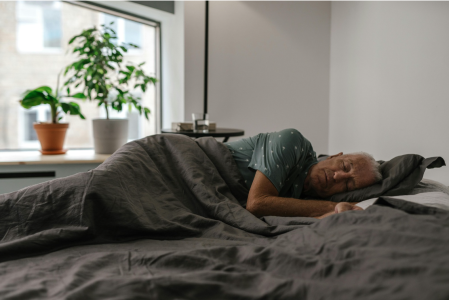Struggling to sleep? Discover 5 genius tricks to beat insomnia tonight
By
Aubrey Razon
- Replies 0
Tired of staring at the ceiling all night, hoping for sleep? You’re not alone, and it’s easier than you think to break the cycle.
We’ve got expert tips to help you fall asleep faster and avoid the one thing ruining your nights.
Before we dive into the nocturnal know-how, let's understand why this matters.
Research has shown that the golden hours for our bodies to repair and rejuvenate fall between 10 p.m. and 2 a.m., a period rich in human growth hormone production and deep sleep.
This isn't just about beauty rest; it's about bolstering your immune system, fortifying muscles and bones, and even potentially increasing your earning potential.
Yes, you read that right—a survey of 2,000 Americans linked early risers with higher earnings.
So, let's explore how to optimize your slumber for health and wealth.
1. Exercise Your Way to Better Zzz's
Physical activity is a fantastic precursor to a good night's sleep.
It's not just about tiring yourself out; exercise can adjust your core body temperature and align your internal clock, easing anxiety and depression along the way.
The Sleep Foundation suggests that regular exercise can help chronic insomniacs fall asleep faster and enjoy a longer, deeper sleep.
Just remember to wind down your workouts well before bedtime to avoid a surge of energy when you're trying to power down.
2. Let There Be Light (In the Morning)
Our bodies are tuned to the rhythms of the sun. Morning light exposure can decrease melatonin production and increase cortisol, signaling it's time to wake up.
So fling open those curtains or enjoy your morning coffee by a sunny window.
For those in darker climates or winter months, consider a UV lamp or a sunrise alarm clock to simulate dawn's gentle awakening.
3. Power Down to Power Up
In our tech-saturated world, it's crucial to give your eyes (and brain) a break from screens before bed.
The blue light emitted from devices can trick your body into thinking it's still daytime, delaying the release of sleep-inducing melatonin.
Aim to disconnect from digital devices at least 30 minutes before you plan to sleep.
4. Create a Cool Sleep Sanctuary
Temperature plays a pivotal role in sleep quality.
Experts suggest keeping your bedroom cool, between 60 and 67 degrees Fahrenheit, to signal to your body that it's time to rest.
Use blankets for warmth rather than cranking up the heat, as a cooler environment supports uninterrupted REM sleep, the stage where dreams occur.
5. Consistency is Key
Routine is the backbone of a healthy sleep cycle. Gradually adjust your bedtime and wake time earlier in 15-minute increments until you reach your ideal schedule.
Then, stick to it—yes, even on weekends. Consistency helps maintain your circadian rhythm, reducing the risk of obesity, heart disease, and depression.
By incorporating these five genius tricks into your nightly routine, you'll be setting the stage for a more restful sleep and a more productive wake.
It's not just about the quantity of sleep but the quality. With these strategies, you can transform your nights from a time of frustration to a period of restoration.
Remember, a few simple changes can make a world of difference. Sweet dreams and even sweeter mornings await!
 Have you tried any of these tricks to improve your sleep? Do you have other tips or rituals that help you drift off to dreamland? Share your experiences and insights in the comments below.
Have you tried any of these tricks to improve your sleep? Do you have other tips or rituals that help you drift off to dreamland? Share your experiences and insights in the comments below.
We’ve got expert tips to help you fall asleep faster and avoid the one thing ruining your nights.
Before we dive into the nocturnal know-how, let's understand why this matters.
Research has shown that the golden hours for our bodies to repair and rejuvenate fall between 10 p.m. and 2 a.m., a period rich in human growth hormone production and deep sleep.
This isn't just about beauty rest; it's about bolstering your immune system, fortifying muscles and bones, and even potentially increasing your earning potential.
Yes, you read that right—a survey of 2,000 Americans linked early risers with higher earnings.
So, let's explore how to optimize your slumber for health and wealth.
1. Exercise Your Way to Better Zzz's
Physical activity is a fantastic precursor to a good night's sleep.
It's not just about tiring yourself out; exercise can adjust your core body temperature and align your internal clock, easing anxiety and depression along the way.
The Sleep Foundation suggests that regular exercise can help chronic insomniacs fall asleep faster and enjoy a longer, deeper sleep.
Just remember to wind down your workouts well before bedtime to avoid a surge of energy when you're trying to power down.
2. Let There Be Light (In the Morning)
Our bodies are tuned to the rhythms of the sun. Morning light exposure can decrease melatonin production and increase cortisol, signaling it's time to wake up.
So fling open those curtains or enjoy your morning coffee by a sunny window.
For those in darker climates or winter months, consider a UV lamp or a sunrise alarm clock to simulate dawn's gentle awakening.
3. Power Down to Power Up
In our tech-saturated world, it's crucial to give your eyes (and brain) a break from screens before bed.
The blue light emitted from devices can trick your body into thinking it's still daytime, delaying the release of sleep-inducing melatonin.
Aim to disconnect from digital devices at least 30 minutes before you plan to sleep.
4. Create a Cool Sleep Sanctuary
Temperature plays a pivotal role in sleep quality.
Experts suggest keeping your bedroom cool, between 60 and 67 degrees Fahrenheit, to signal to your body that it's time to rest.
Use blankets for warmth rather than cranking up the heat, as a cooler environment supports uninterrupted REM sleep, the stage where dreams occur.
5. Consistency is Key
Routine is the backbone of a healthy sleep cycle. Gradually adjust your bedtime and wake time earlier in 15-minute increments until you reach your ideal schedule.
Then, stick to it—yes, even on weekends. Consistency helps maintain your circadian rhythm, reducing the risk of obesity, heart disease, and depression.
By incorporating these five genius tricks into your nightly routine, you'll be setting the stage for a more restful sleep and a more productive wake.
It's not just about the quantity of sleep but the quality. With these strategies, you can transform your nights from a time of frustration to a period of restoration.
Remember, a few simple changes can make a world of difference. Sweet dreams and even sweeter mornings await!
Key Takeaways
- Engaging in regular exercise can lead to improved sleeping patterns, but it is recommended to avoid vigorous activity close to bedtime.
- Exposure to light in the morning, such as sunlight or artificial light sources like UV lamps, can help adjust your internal clock and support an early bird routine.
- Reducing exposure to blue light from screens before bed can aid in the production of melatonin, beneficial for achieving an earlier bedtime.
- Keeping your bedroom cool (between 60 and 67 degrees Fahrenheit) can help in falling and staying asleep, plus maintaining a consistent sleep routine is important for circadian rhythm stability.







